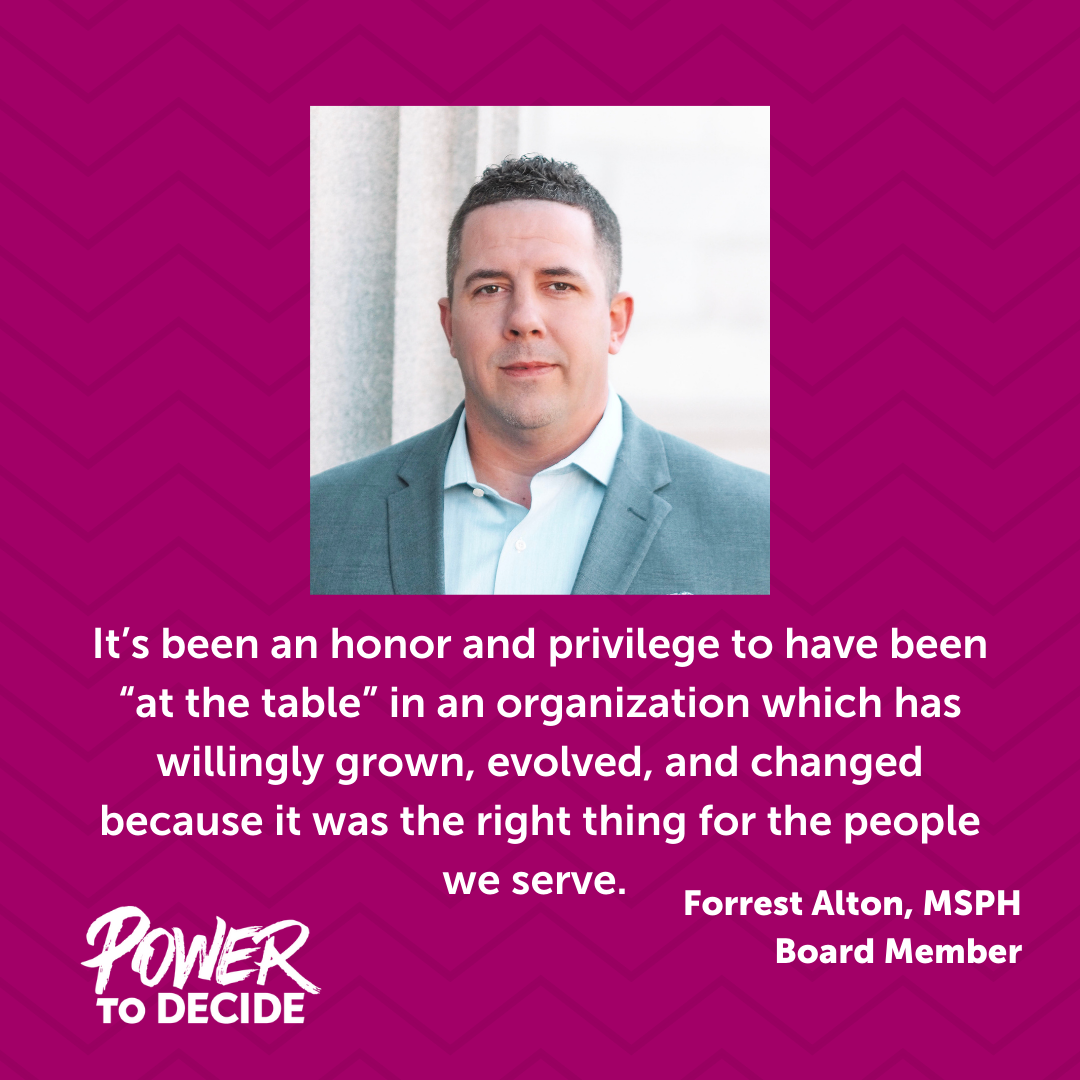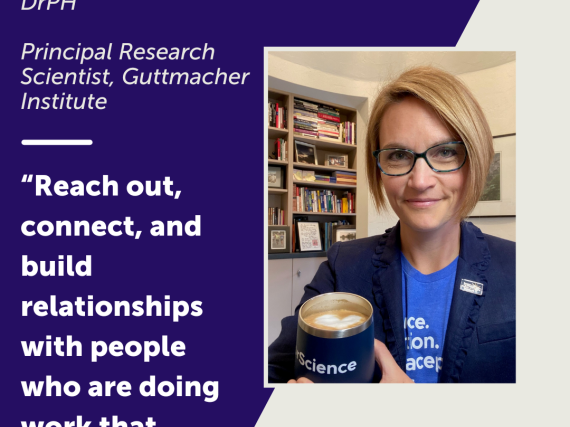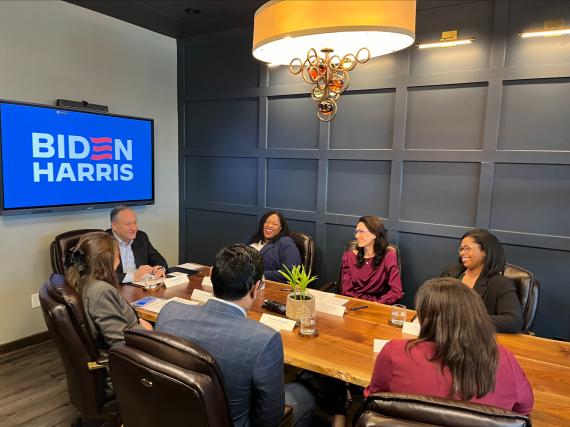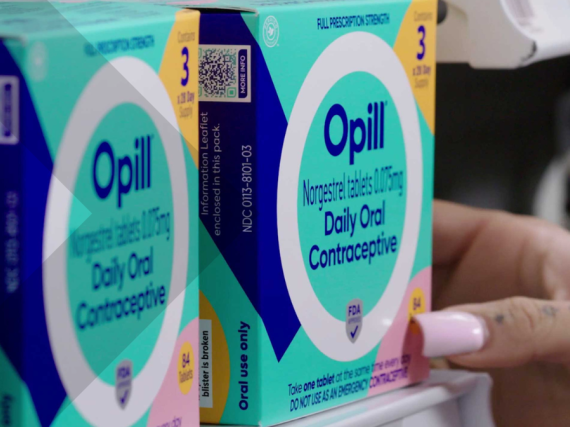August 2021 Power Player
At Power to Decide, we’re committed to uplifting the many individuals on the ground doing the work that matters most. Each month we highlight an individual who is championing the effort to support young people’s reproductive well-being. Check out this month's Power Player profile.
Forrest Alton, MSPH
Founder and President, 1,000 Feathers
How did you get started in your field? What is your driving force?
Wow… we have go back a little over 20 years to my first “real job” after finishing my undergraduate degree. I was hired by a small organization in Georgetown, South Carolina to develop and run a youth development and service learning program; a program I soon learned was funded through a teen pregnancy prevention grant. Sometimes when you’re starting your career you’re searching for your passion. And sometimes your passion finds you. I experienced the latter firsthand. That first real job quickly turned into a passion and a career that continued at the South Carolina Campaign to Prevent Teen Pregnancy (now Fact Forward) where I spent 17 years, including serving for nearly a decade as the organization’s CEO. At some point on that journey, I joined the board of what was at the time the National Campaign to Prevent Teen Pregnancy (now Power to Decide).
As to my driving force, my wife and I don’t have children of our own, but we do have seven nieces and nephews who have grown up right in front of me as my career has advanced. Whether I was doing direct service work or even in my administrative and leadership roles, I left my home every morning thinking of them. All of my nieces and nephews are fortunate to have moms and dads and grandparents and aunts and uncles who surround them, lift them up, and provide them with all of the resources and opportunities they need. It didn’t take me long to realize, once I got out into the world, that the level of resources, opportunities, and family supports that my nieces and nephews have are the exception not the rule. My passion comes in large part from a desire to make sure that all children have access to this same level of resources, opportunities, and supports so that they too can thrive.
What work have you done to ensure that all people have the information and access they need to make decisions that align with their intentions and improve their reproductive well-being?
It has become my life’s work to ensure that information and access is available for all people—and more and more deepening my understanding that “all” is the operative term here. My time on this earth has provided me experiences that have made it clear that access and opportunity are not evenly distributed in this country. Who you are, who your parents are, and the zip code you were born in are undeniably connected to so many outcomes we care about, including reproductive health and well-being.
From my time running afterschool programs, to a state level view at the South Carolina Campaign to Prevent Teen Pregnancy, to being a part of the national dialogue through Power to Decide and otherwise, one of the things that has been really interesting to me is the evolution of thought in the field that got us here. Twenty-five years ago, the entire field was focused solely on preventing teen pregnancy, which almost universally translated to implementing sex ed in schools. Then some people started including teen friendly reproductive health services into the conversation. Then the larger constructs of information and access entered the chat. Finally, the field as a whole is now starting to talk about these more upstream topics like access to reproductive health and other resources, reproductive rights and justice, and even bigger constructs like race and intersectionality. The work has become more about transforming entire systems and changing environments more than it is about the implementation of a particular program or intervention. Granted, there are individual organizations that have been having these conversations for a long time, but the evolution of thought across the field over time has been one of the fascinating things for me.
Similarly, in our work at 1000 Feathers—a consulting firm I’ve run since 2016—we have become much more interested in community and organizational transformation. We work in early childhood education, poverty, and homelessness, but at the same time, we always enjoy getting pulled back into the reproductive health space.
What advice would you give to someone looking to effect change in the field that you currently work in?
Something I’d say to anyone entering this space is that if you don’t have a passion for this work—or develop a passion quickly—you probably need to find an exit strategy. You can’t bluff your way through working with young people and that’s especially true with adolescent sexual health. This work requires a certain level of dedication and willingness to have courageous conversations in order to see progress.
I’ve also been extremely fortunate to connect with national leaders in this field and had the opportunity to be mentored by special people like Sarah Brown, Barbara Huberman, and Doug Kirby. If you’re in this field and don’t recognize those names, please stop reading right now and go look them up… My journey has benefitted so greatly from mentors and ‘elders’ in the field. My advice to others is to reach out to those folks who have been doing this work for a while and benefit from their mentorship. At the same time, don’t be afraid to push back against people who say, “I’ve been doing this work for 20 years and here’s how we’ve always done it…” Use their experience to help you learn, but also know when to push back and lead on your own. And if you’re one of the elders—I guess this includes me now—we need to know when to step back and listen to the new ideas and voices that are emerging around us.
Is there a highlight of your work in conjunction with our organization that you’d like to share?
More than a singular moment, what’s been really fun but also energizing about being associated with Power to Decide for two decades is watching it grow and evolve. It’s a fundamentally different organization than it was in the mid-90s because it has to be to continue to contribute to the field.
I was in the room when the leadership talked about changing the name the first time and adding “Unplanned Pregnancy” after “The National Campaign to Prevent Teen Pregnancy,” and I was in the room again when the name changes Power to Decide. I was also there when we began talking about being more intentional and positioned around abortion and access to care issues too. Any one of those moments I could single out, but it’s more the collection of them.
It’s been an honor and privilege to have been “at the table,” in a leadership role, in an organization which has willingly grown, evolved, and changed—even when change was hard—because it was the right thing for the people we serve.



